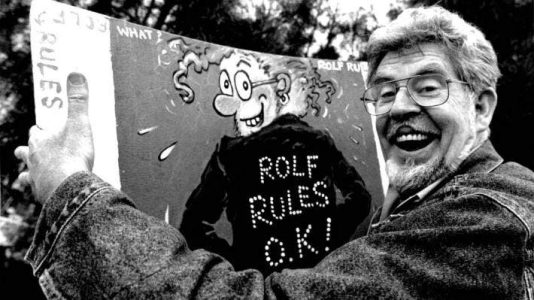Rolf Harris passes away at 93 following health struggle
Rolf Harris, the Australian entertainer and convicted sex offender who spent decades in the spotlight, has passed away.
Harris, 93, has reportedly died after a lengthy struggle with neck cancer, and his passing was further complicated by the 'fragility of old age'.
Harris had an illustrious career in show business, but his legacy was marred by his arrest on indecent assault charges in 2013. Though his death was first publicly announced on Tuesday, his death certificate reveals that he had passed away several weeks earlier, on May 10—the day before an ambulance was spotted outside his UK residence.

There had been widespread speculation about Harris's declining health since late 2022 when it was revealed that he had become severely unwell. The gap between his passing and its official documentation allowed his family to hold a funeral and cremate him privately, away from the public eye.
In a brief statement, the family shared that Harris 'died peacefully surrounded by family and friends and has now been laid to rest'.
Harris is survived by his wife of 65 years, Alwen Hughes, 91, who is battling Alzheimer's disease. The couple required around-the-clock care, with friends and neighbours expressing concern for their well-being.
Rolf Harris was born in 1930 in Bassendean, Perth's northeast, and went on to make a name for himself in both sports and entertainment. Originally gaining recognition as a champion swimmer, he moved to London in the early '50s to study art.
Following early gigs with the BBC and ITV as a performer and illustrator, Harris achieved international fame for his art and music. His most notable hit, the Australian-inspired song 'Tie Me Kangaroo Down, Sport', was released in 1957, and he even painted a portrait of Queen Elizabeth II in 2005.
Harris's career saw him receive numerous awards and honours. He was appointed a Member of the Order of the British Empire in 1968 and a Member of the Order of Australia (AM), advancing to Officer (AO) in 2012.
Following his release in mid-2017, Harris faced further legal battles. He was cleared of additional sexual assault charges but continued to be largely absent from the public eye. Despite maintaining his innocence throughout the legal proceedings and criticising the charges against him as ‘ludicrous’, the scandal surrounding his convictions resulted in the termination of his career.
As a coping mechanism during his time in prison, Harris turned to art, using it as a form of therapy. Notably, he created several pieces, including Rock Drill, which were displayed in an Edinburgh gallery in the same year. However, his artistic endeavours did not restore his reputation or former standing in the entertainment industry.
The consequences of the scandal extended beyond Harris's professional life. His numerous accolades and honours were revoked. Furthermore, he struggled to re-enter society after his release, leading a reclusive life with limited public appearances and difficulties in social interactions.

In summary, Rolf Harris's later years were defined by deteriorating health and the repercussions of his conviction for indecent assault charges. Despite his notable achievements and international acclaim, his legacy remains tarnished by the scandal and legal battles that ensued.
Harris lived a secluded existence, facing the challenges of reintegrating into society and having his honours revoked. His life stands as a cautionary tale, where controversy and the consequences of his actions overshadow his accomplishments.
Harris, 93, has reportedly died after a lengthy struggle with neck cancer, and his passing was further complicated by the 'fragility of old age'.
Harris had an illustrious career in show business, but his legacy was marred by his arrest on indecent assault charges in 2013. Though his death was first publicly announced on Tuesday, his death certificate reveals that he had passed away several weeks earlier, on May 10—the day before an ambulance was spotted outside his UK residence.

Renowned Australian figure, Rolf Harris, peacefully departs at the age of 93 after enduring a prolonged battle with his health. Source: Simon Alekna of the Sydney Morning Herald
There had been widespread speculation about Harris's declining health since late 2022 when it was revealed that he had become severely unwell. The gap between his passing and its official documentation allowed his family to hold a funeral and cremate him privately, away from the public eye.
In a brief statement, the family shared that Harris 'died peacefully surrounded by family and friends and has now been laid to rest'.
Harris is survived by his wife of 65 years, Alwen Hughes, 91, who is battling Alzheimer's disease. The couple required around-the-clock care, with friends and neighbours expressing concern for their well-being.
Rolf Harris was born in 1930 in Bassendean, Perth's northeast, and went on to make a name for himself in both sports and entertainment. Originally gaining recognition as a champion swimmer, he moved to London in the early '50s to study art.
Following early gigs with the BBC and ITV as a performer and illustrator, Harris achieved international fame for his art and music. His most notable hit, the Australian-inspired song 'Tie Me Kangaroo Down, Sport', was released in 1957, and he even painted a portrait of Queen Elizabeth II in 2005.
Harris's career saw him receive numerous awards and honours. He was appointed a Member of the Order of the British Empire in 1968 and a Member of the Order of Australia (AM), advancing to Officer (AO) in 2012.
Rolf Harris: From Entertainment to Trial and Conviction
Rolf Harris saw his career take a sharp downturn when he was arrested in 2013 as part of a UK police investigation into sexual offences. The charges against him included the production of indecent images of children. In 2014, Harris was convicted of 12 counts of indecent assault against four teenage girls spanning from 1968 to 1986. This led to his sentencing to a jail term of five years and nine months, during which he served three years at Stafford Prison in England's Midlands.Following his release in mid-2017, Harris faced further legal battles. He was cleared of additional sexual assault charges but continued to be largely absent from the public eye. Despite maintaining his innocence throughout the legal proceedings and criticising the charges against him as ‘ludicrous’, the scandal surrounding his convictions resulted in the termination of his career.
As a coping mechanism during his time in prison, Harris turned to art, using it as a form of therapy. Notably, he created several pieces, including Rock Drill, which were displayed in an Edinburgh gallery in the same year. However, his artistic endeavours did not restore his reputation or former standing in the entertainment industry.
The consequences of the scandal extended beyond Harris's professional life. His numerous accolades and honours were revoked. Furthermore, he struggled to re-enter society after his release, leading a reclusive life with limited public appearances and difficulties in social interactions.
Key Takeaways
- Australian sex offender Rolf Harris has died aged 93 after a battle with neck cancer.
- Harris was a well-known entertainer for decades until his arrest on indecent assault charges in 2013.
- The family held a private funeral for Harris and cremated him away from the public eye.
- In 2014, Harris was convicted of 12 counts of indecent assault and sentenced to a jail term of five years and nine months, of which he served three years.
In summary, Rolf Harris's later years were defined by deteriorating health and the repercussions of his conviction for indecent assault charges. Despite his notable achievements and international acclaim, his legacy remains tarnished by the scandal and legal battles that ensued.
Harris lived a secluded existence, facing the challenges of reintegrating into society and having his honours revoked. His life stands as a cautionary tale, where controversy and the consequences of his actions overshadow his accomplishments.







